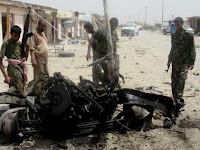Operating in the Dark
Twelve year old girl and her brothers were playing around the house, and she was accidentally shot with an AK-47. We don't know the specific circumstances of why or how it happened. It just did. Nor does it matter to us, of course. Not part of the job description. We are here to do all we can irregardless of who, what, how, or why.
Little known fact: Ar Ramadi is run entirely on generators. Every light bulb, DVD player, TV, you name it is run from a generator. Walk anywhere on base and you will quickly notice the maddening and inescapable drone of a nearby generator. Unlike the stable power grids in Western countries, generator power fluctuates, causing routine brownouts and surges. Brave is the soul who uses a computer on Ar Ramadi without surge protection. Generator power also happens to be a lot less reliable. The picture below was taken as the power went out during the middle of the case. "Grab the flashlights" RH quips as one of the corpsman runs outside to start the axillary generator for our lone OR light. Monitors and anesthesia machine had to rely on battery backup for 20 minutes while we waited for power to be restored. As for our case, not a beat was missed. We kept right on operating in the dark.

Stable for the flight to Al Asad, I was able to give a liberal amount of pain and sedation medications to keep her comfortable for the helo ride. The image below was taken in-flight. I have her in a protective bag we refer to as a "hot pocket" to prevent evaporating heat loss at altitude. The doors are all open, and a lot of air is streaming through during flight. Oxygen tank slipped between her legs, I have the ventilator and monitor placed on a folded blanket pad on her lower legs. We are ever vigilant to ensure anything placed on the patient has thick padding to prevent any discomfort. I left myself an IV port taped on her shoulder for quick access as I give blood and medications during the flight. Just off to the side is my flight bag, an extra oxygen tank, and a portable suction unit. No time to sight see during the flight. It's an endless loop of assessing vital signs, ensuring the ventilator is working correctly, the oxygen tank isn't empty, and checking her to make sure she is comfortable and isn't waking up. For her to awaken in this environment would be a frightening, disorienting, and frustrating experience......so I do all I can to keep her peaceful and blissfully asleep for the ride.

After dropping our patient off at the medical helo pad at Al Asad, we fly directly to the "fuel farm". Aircrew told me repeatedly we were "on fumes" as the helo sat on the medical pad, resulting in a mad dash to grab flight equipment and make a run for it. After a top-off, we race back to Ramadi with the Cobra Gunship close behind.































